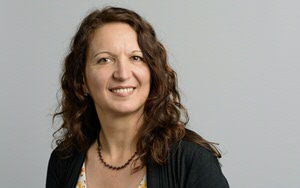Elisabetta Chicca new professor Bio-inspired Circuits & Systems
Our brains are one of the most complicated machines we know, but little by little researchers are able to figure out more details. Some researchers are even able to translate the processes of the brain into electrical systems. Elisabetta Chicca is one of these researchers, and in August she joined the Zernike Institute as professor Bio-inspired Circuits & Systems.

“I am very excited about joining this team”, says the newly appointed professor. “I was welcomed with open arms and feel like a lot of people in the institute would like to cooperate with me, so there will be a lot of interesting new opportunities.”
Chicca’s work is said to be one of the missing pieces, the step that was so far missing from the institute: “A lot of people study the brain and make models of how certain processes work, but these models are often very abstract and they live in an ideal world. I work on the next step: actually building electrical circuits that mimic the processes of neurons and synapses.”
More interdisciplinary
Chicca started her career as a physicist at the University of Rome, but her research soon became more interdisciplinary. “When I started my PhD in Zurich I was only familiar with the theoretical physics side of building neural networks, so I had to learn a lot about neurobiology and electrical engineering. But this made me appreciate this field of research even more.”
The main reason Chicca wants to mimic the processes in the brain is to get a better understanding of how these processes work. “Feynman used to say: what I cannot create, I do not understand. I think this is true because when we build our neural networks it gives us many new insights. I’m not saying the environment is exactly the same, but we do encounter space and energy constraints that might also play a role in the brain.”
One of her favourite projects at the moment is that of PhD student Thorben Schoepe. In this project, she is trying to understand insect navigation. “We look at the way a honeybee navigates through an environment, looks for flowers, and goes back to the beehive”, she explains. “This sounds simple enough, but it requires a lot of different tasks to be performed simultaneously and in the right order. Just to keep flying is already very complicated.”
Thanks to her collaboration with the group of professor Martin Egelhaaf at Bielefeld University, they were able to develop a computational system: “With the knowledge of the biologists, we developed a system which exhibits interesting behaviors comparable to that of the biological counterpart. We can use this system to verify the hypothesis about the computational role of bits and pieces of the insect brain.”
Using this model, the researchers build a neural network that powers a small robot. Chicca: “When it encounters an obstacle, it will make a turn and avoid it.” Unfortunately, the robot seemed to bump into the obstacles way more often than a bee would. The problem, as it turns out, was one missing neuron. “In nature, the bee slows down if the environment is too crowded. We added a single neuron to our neural network that senses how many obstacles are in the environment and used its output to change the speed of the robot. This was enough to substantially improve the performance of the robot.”
Applying the system
Of course, these kinds of processes won’t only yield fundamental insights. Chicca hopes she can also contribute to some real-life applications. “It would be great if we could build a system that does something artificial intelligence is not yet able to do. Our work can provide solutions for tasks that conventional computing can’t manage because of the limited availability of resources like energy and data. We can for instance aim to equip small navigating agents running on batteries with cognitive abilities, so that they can navigate through complex environments and, for example, search for survivors in a rescue scenario.”
But she also aims at investigating new technological solutions thanks to collaborations at Zernike. “Several groups here are exploring novel materials and their use for computation. The possibilities to collaborate with them open new exciting avenues for my research.” Chicca is already busy setting up collaborations with colleagues at the Zernike Institute. “Besides the generous offer from the Zernike and CogniGron Institutes I also recently got some funding, so my group will be able to grow and take on more and more interesting projects.”
One of the topics she would like to focus on is learning. “We know a bit about how people learn, for instance, that the synapse changes while we learn. But there is no general theory that can bring it all together. One of my dreams would be to find such a theory, and explain everything.”
Meanwhile, she is getting used to living in Groningen. “I have been here so many times before, but it is still a bit unreal that I am actually living here now. I am getting to know the city even better now and enjoying the beautiful nature. I love it, and everybody is making such an effort to make me feel at home, both professionally and personally. I look forward to advancing my research here for many years to come.”
| Last modified: | 12 October 2020 09.55 a.m. |
More news
-
16 December 2024
Jouke de Vries: ‘The University will have to be flexible’
2024 was a festive year for the University of Groningen. In this podcast, Jouke de Vries, the chair of the Executive Board, looks back.
-
10 June 2024
Swarming around a skyscraper
Every two weeks, UG Makers puts the spotlight on a researcher who has created something tangible, ranging from homemade measuring equipment for academic research to small or larger products that can change our daily lives. That is how UG...
